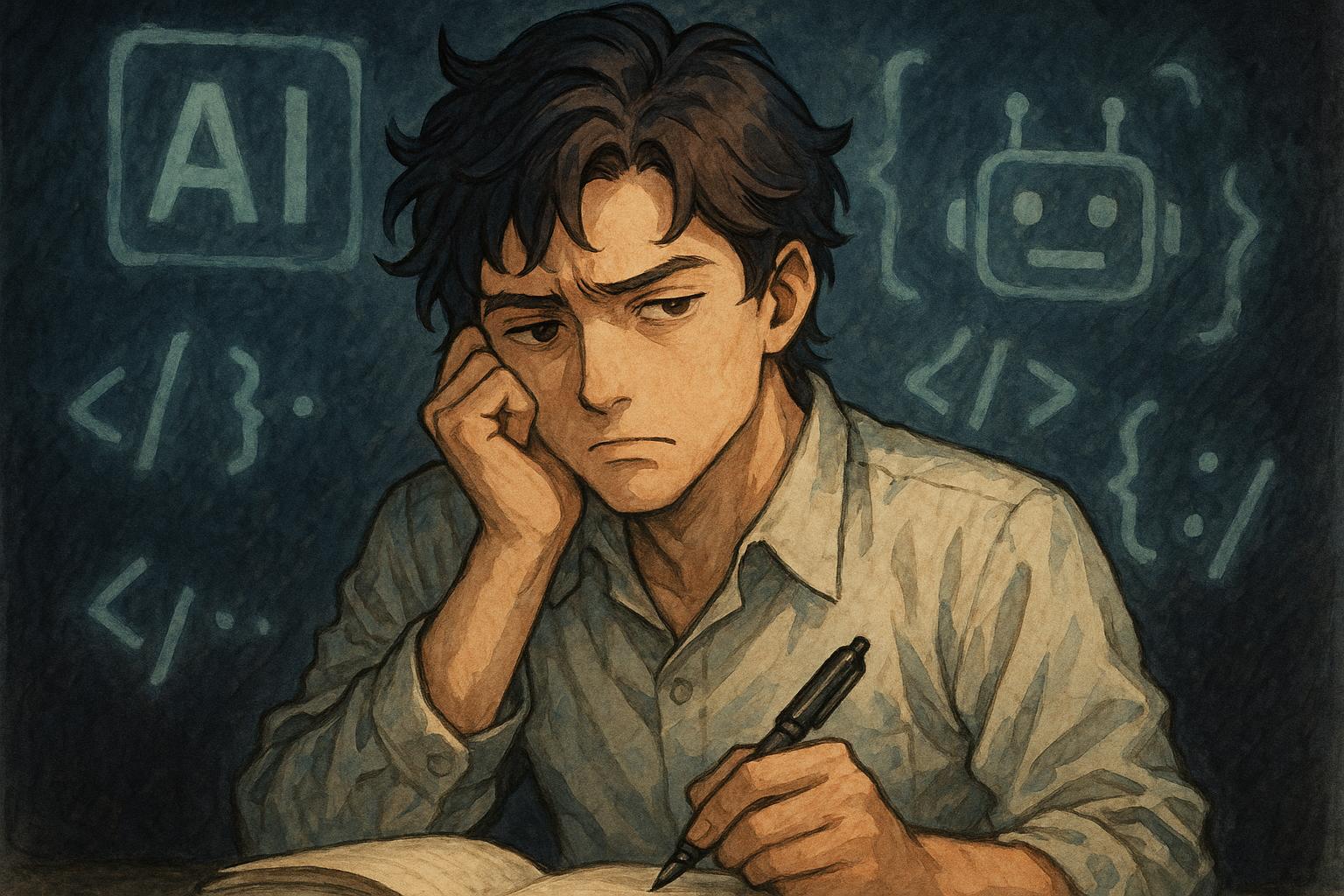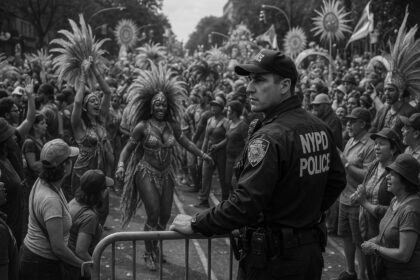A growing number of writers, artists, and scholars are rejecting generative AI tools, citing concerns over inaccuracies, ethical dilemmas, and threats to genuine human creativity and connection.
The rise of generative artificial intelligence (AI) has prompted a notable backlash among creatives and academics, as increasing numbers express their desire to resist or outright reject its integration into their lives and work. Novelist Ewan Morrison is one prominent figure in this movement, voicing his distrust of AI systems that often produce false information. His light-hearted account of interacting with ChatGPT is revealing; after asking for a list of his published works, he was presented with a fictitious title, “Nine Inches Pleases a Lady,” and two non-existent books, highlighting the inherent unreliability of AI-generated content. Morrison’s latest novel, For Emma, creatively explores the ramifications of AI brain implants, reflecting his concerns about technology’s encroachment on the human experience.
Morrison’s resistance is mirrored by others in the creative sectors. They fear that generative AI, while touted for its efficiency, poses serious threats to artistic integrity and the job market. Many cite a recent study revealing that over 60% of AI-generated answers were inaccurate. The sentiment among these professionals is clear: they prefer human creativity over the mechanical output of AI, which they see as a poor substitute for authentic human expression. Morrison argues that the algorithms driving project approvals in Hollywood only perpetuate the recycling of past content, stifling original storytelling.
Beyond artistic fields, the implications of AI resonate in other professions as well. For instance, in the legal domain, some commentators argue that firms must embrace AI to remain competitive, yet Morrison warns that those who forgo it may face dire repercussions. Critics of this trend, including Morrison, argue that the promise of AI often turns out to be an illusion meant to attract investment, leading to rushed implementations that overlook ethical considerations.
Equally grounded in this resistance is April Doty, an audiobook narrator who decries the environmental costs associated with AI technologies. She criticises Audible for enabling publishers to produce AI-narrated audiobooks, expressing concern that such developments threaten to ruin the intimate experience of storytelling. Doty asserts that while machines can recite words, they lack the nuanced understanding and emotional depth necessary to capture a narrative authentically.
Academics share similar apprehensions. Emily M Bender, a linguistics professor at the University of Washington, articulates her aversion to large language models. She argues that reading is fundamentally about understanding diverse human perspectives, which AI-generated text cannot provide. While she acknowledges the allure of convenience that AI offers, she cautions against the emotional detachment it fosters and warns of the potential deepening isolation that arises from interactions mediated solely through machines.
Yet, the reality is complex. Many, including IT professional Tom, find themselves reluctantly acknowledging the pressure to incorporate AI tools into their workflows. Tom relates how his colleagues have leveraged AI to simplify their work tasks, a trend he feels places him at a disadvantage. Acknowledging the ethical dilemmas posed by AI, he grapples with the notion of compromising his principles to keep pace in a changing workplace.
Contrary to the techno-optimism of AI proponents who assert that reliance on machines is a natural progression, many resist this narrative. Justine Bateman, a filmmaker and writer, vehemently rejects the idea that society should become increasingly dependent on AI. She expresses concern that such reliance diminishes our humanity and emotional depth, suggesting that generative AI reduces creativity to mere replication.
The conversation surrounding generative AI and its impact on various professional domains, from art to law, reveals a broader cultural debate about technology’s role in society. Critics argue that while AI may offer efficiency and cost savings, it threatens creativity, personal connection, and ethical standards. As the discourse continues to evolve, the challenge lies in finding a balance between embracing innovation and preserving the fundamental qualities that define the human experience.
 Reference Map:
Reference Map:
- Paragraph 1 – [1], [2]
- Paragraph 2 – [1], [4]
- Paragraph 3 – [2], [3], [5]
- Paragraph 4 – [1], [5]
- Paragraph 5 – [6], [7]
- Paragraph 6 – [1], [6]
- Paragraph 7 – [1], [5]
- Paragraph 8 – [1], [7]
Source: Noah Wire Services
- https://www.theguardian.com/technology/2025/jun/03/creatives-academics-rejecting-ai-at-home-work – Please view link – unable to able to access data
- https://www.theguardian.com/technology/2025/jun/03/creatives-academics-rejecting-ai-at-home-work – An article from The Guardian discusses how creatives and academics are rejecting the use of generative AI in their work and personal lives. It highlights concerns about AI’s potential for harm, inaccuracies, and the preference for human creativity over machine-generated content. The piece features insights from novelist Ewan Morrison, who distrusts AI systems due to their tendency to produce false information, and other professionals who are actively resisting AI integration in their fields.
- https://www.ft.com/content/0f36eb4e-b90f-4ffe-befc-daf01829c182 – An article from the Financial Times explores the potential impact of generative AI on the legal profession. It discusses how AI could revolutionise legal services by enabling firms to deliver solutions at scale, and the importance for law firms to embrace this technology to remain competitive. The piece includes insights from Morrison, who warns that firms not adopting AI may face erosion until it’s too late.
- https://www.aestora.com/essays/generative-ai – An essay from Aestora examines the limitations of generative AI, particularly its inability to discern objective reality. It critiques the tendency of tech evangelists to equate all information, regardless of truthfulness, and discusses the potential dangers of this approach, including the spread of misinformation and the erosion of democratic values.
- https://refusinggenai.wordpress.com/ – A blog dedicated to the discussion of rejecting generative AI in writing studies. It presents arguments against the use of AI in academic writing, emphasising the importance of human creativity and critical thinking. The blog also critiques the ideological biases inherent in AI technologies and their impact on education.
- https://ondiscourse.com/media-companies-shouldnt-reject-generative-ai/ – An article from On Discourse argues that media companies should not reject generative AI but instead build their own AI models. It discusses the potential benefits of AI in the media industry, including content personalisation and workflow improvements, and the importance of media companies embracing AI to drive innovation.
- https://www.artistsresist.org/the-case-for-model-dispersion-why-ai-art-is-not-transformative/ – An article from Artists Resist critiques the notion that AI-generated art is transformative. It argues that AI models do not create original works but rather remix existing content, raising questions about authorship and the value of AI-generated art in the creative industry.













